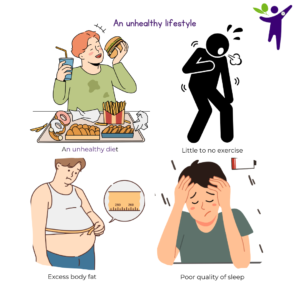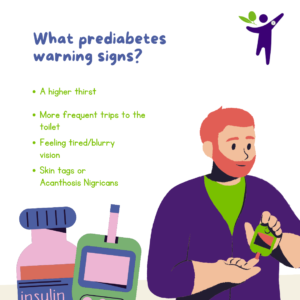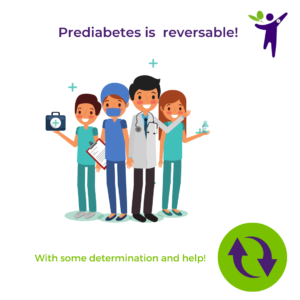Prediabetes and type 2 diabetes are metabolic diseases that are becoming increasingly prevalent. Globally, there are more than 422 million people with diabetes compared to around 108 million in 1980. In the UK, almost 3.7 million people have been diagnosed with diabetes, but it is estimated that the total number of people with diabetes is closer to 4.6 million. In England, 1 in 3 adults have prediabetes. However, this number was closer to only 1 in 10 adults in 2003. Estimates suggest that 50% of all people who are overweight and over 40 years of age have prediabetes.

What is prediabetes?
Prediabetes or “non-diabetic hyperglycaemia” is a condition where blood glucose levels are higher than normal. Left untreated, the glucose levels may increase further. This is when prediabetes develops into type 2 diabetes. However, treating prediabetes is possible. Taking action and having prediabetes treatment can reverse the condition and help prevent the onset of type 2 diabetes.
Download a free copy of our prediabetes e-book which goes into a lot more detail:
What causes prediabetes?
Many factors contribute to the risk of developing prediabetes. However, an unhealthy lifestyle is the biggest cause. An unhealthy lifestyle can be described as having:
- A poor diet
- Low activity levels
- Excess weight
- Poor quality of sleep
However, there are other risk factors you cannot control:
- If you have a family history of diabetes
- Having Hispanic, African or a Pacific Islander racial heritage
- Being older than 45
- Having had gestational diabetes or a baby who weighed over 9 pounds (4.1 kg)
- Having polycystic ovary syndrome or obstructive sleep apnea
You cannot control these risk factors so it’s important to make healthy lifestyle choices to reduce your risk of developing prediabetes.
What are the warning signs of prediabetes?
Most people with prediabetes don’t know they have it. This is because many people will not experience any symptoms. Those that do may find themselves:
- Being thirstier than normal
- Needing to go to the toilet more frequently.
- Feeling tired
- Blurry vision
- Having skin tags or Acanthosis Nigricans
There are often no signs to warn that you have prediabetes. It’s only when the condition develops into type 2 diabetes that symptoms begin. By which time it may be too late to prevent the onset of full diabetes.
How is prediabetes diagnosed?
If you or your doctor suspects you have prediabetes, you will most likely be given a blood test. There are two types of blood tests you can have to diagnose prediabetes:

- The fasting plasma glucose test measures how much glucose is in your blood after a period of fasting (not eating).
- The HbA1c test measures the numbers of glycated red blood cells a.k.a. red blood cells that have bonded to glucose.
Another way to diagnose prediabetes is the oral glucose tolerance test (OGTT). You are given a sugary drink and your blood glucose levels are monitored over the next few hours to see how you respond. You will have prediabetes if: our fasting plasma glucose is between 5.5 and 6.9. Your HbA1c count is between 42 and 47 (can also be expressed as between 6.0% and 6.5%) Any results above these levels and you will either be diagnosed with type 2 diabetes or be given a different test to confirm diabetes.
You may hear your doctor talk about impaired fasting glucose (IFT). This means after some time without eating, your blood sugar levels are abnormally high. Impaired glucose tolerance (IGT) means soon after eating, the spike in blood sugar is abnormally high.
Is prediabetes reversible?
Yes, once diagnosed prediabetes is reversible with the correct changes to your diet and lifestyle. These changes may include avoiding sugar in the diet, reducing the amount of carbs you eat, daily or regular exercise, eating a diet low in processed foods, reducing your alcohol intake, losing weight, avoiding sedentary behaviour. Your doctor will also recommend you stop smoking if you haven’t already done so.
Why is it important to treat prediabetes?
Left untreated, prediabetes can develop into type 2 diabetes. Each year, around 5 to 10% of people with prediabetes will develop type 2 diabetes. Type 2 diabetes cannot be cured but it can be managed and possibly reversed. However, it can be a life-long, chronic condition that will have profound consequences to your health. Type 2 diabetes is linked to many serious health conditions:
- Heart disease
- Stroke
- Hypertension
- Nerve damage to fingers and toes that may eventually affect the whole limb.
- Erectile dysfunction in men
- Kidney damage leading to kidney failure
- Eye disease including blindness
- Hearing impairment and deafness
- Alzheimer’s disease
- Some cancers
- Reduced life expectancy
 Should I worry about my prediabetes?
Should I worry about my prediabetes?
Terminology like “Pre” might make you assume that prediabetes is nothing to worry about. But this is a misconception. Prediabetes is undoubtedly something that you should take very seriously because it’s one step away from developing type two diabetes. Preventing type 2 diabetes is significantly better than living with type 2 diabetes. Even if the condition is properly managed, anyone with type 2 diabetes can expect some kind of significant impact on their health including dying up to 10 years earlier. The cost of treating diabetes according to NHS Digital, has almost doubled in the last ten years from £650 million to a staggering £1.07 billion in 2018/19. Diabetes medicines account for nearly 13% of the total cost of prescribing for England – more than any other condition. Catching prediabetes early, before it turns in type 2 diabetes is therefore paramount for the individual and the NHS.
What Next?
Act: If you have concerns around diabetes or symptoms you are worried about you should start to look at taking some active changes in your life. If you are floundering and don’t’ know where to start, we are here to help. ProLongevity’s founder Graham Phillips, has a wealth of experience as a qualified pharmacist and with 35 years of experience aims to help treat the fundamental problems people are facing with diabetes. Not only this but with our clinical team who have over 100 years’ experience helping people with diabetes and related conditions we are more than able and willing to help anyone suffering with diabetes improve and change their lives for the better.
If you would like to see some of the success stories from our programmes you can find them here: https://www.prolongevity.co.uk/success-stories/
Contact us:
Here at ProLongevity our mission is to address the root causes of disease, not merely mask the symptoms with ever more drugs while the disease itself gets progressively worse.
That’s why ProLongevity creates a nutrition and exercise plan that is uniquely tailored to your personal biology. This process of ‘Precision Nutrition’ can tackle the root cause of your prediabetes as well as tackle many other health problems. In just 8 weeks, we’ll guide you to a healthier more sustainable lifestyle with regular 1-2-1 coaching from qualified health professionals.
Our goal goes much beyond treating diseases. We aim to help you Live Healthy for Longer. What value would you place having an extra 10 years of vital, healthy life?
So next time, please consider opting for a FREE, no-obligation exploratory call with our founder Graham Phillips. It might change your life!





